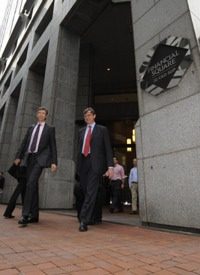
Goldman Sachs Group, Inc. executive director Fabrice Tourre probably didn’t help his company’s public relations efforts (assuming it has some) by referring to an index that facilitates derivatives trading as "a little like Frankenstein turning against his own inventor." But Tourre made that observation in January 29, 2007 e-mail that predated the crisis in the subprime mortgage market.
And neither he nor anyone else at Goldman Sachs knew that that communication would be among the 70 pages of e-mails released over the past weekend to a U.S. Senate subcommittee that is about to hold hearings on the company’s activities during the mortgage meltdown. Tourre is also the only employee named in a Securities Exchange Commission lawsuit against Goldman Sachs, alleging the firm misled investors in a 2007 collateralized debt obligation about the role played by hedge fund Paulson & Co. The SEC is suing Goldman Sachs for fraud because Goldman did not tell investors that Paulson & Co. had played a role in advising the group that was selecting the residential mortgage-backed securities that were to be part of the "collateralized debt obligations" (CDO) and that Paulson & Co then bet that the CDO would not perform well..
Tourre, 31, wrote many of the messages released by the company, including, the New York Times reports, one written to his girlfriend about the direction of the subprime mortgage market. "According to Sparks, that business is totally dead, and the poor little subprime borrowers will not last so long," Tourre wrote in the March 7, 2007 e-mail. The reference was to Dan Sparks, then the head of Goldman’s mortgage trading.
The messages reveal Goldman made millions more than it lost in betting on the subprime market. The company’s losses on its "long" bets that the mortgage securities would increase in value were outweighed by the profits made on its "short" bets that the values would drop. "Of course we didn’t dodge the mortgage mess," Lloyd C. Blankfein, wrote in a November, 2007 message. "We lost money, then made more than we lost because of the shorts." At that time, roughly 10 months before the financial "meltdown" of 2008, Blankfein expressed uncertainty about the direction of the mortgage market, "It’s not over, so who knows how it will turnout ultimately," he wrote. David A. Viniar, Goldman’s chief financial officer, responded to news that the company made a $51 million profit from bets that housing securities would drop in value by writing in a July, 2007 message to Gary Cohn, now Goldman’s president: "Tells you what might be happening to people who don’t have the big short."
"Documents released by the Senate subcommittee," the Times reported "appear to indicate that in July 2007, Goldman’s accounting showed losses of $322 million on positive mortgage positions, but its negative bet — what Mr. Viniar called ‘the big short’ — brought in $373 million."
But it’s still not clear from all this whether Goldman’s betting on the securities was either illegal or unethical, or merely that its offense is that it made money on other people’s losses. Every trader knows his investment may go either up or down in value. He is gambling on the market. But no one alleges that Goldman Sachs caused the mortgage securities to lose their value. They apparently gained more than they lost in their long and short bets, but if they could rig the market, chances are they wouldn’t have lost bets totaling $322 million.
In the SEC suit, the allegation is that Goldman sold mortgage securities without disclosing that hedge fund manager John Paulson was betting that those same securities would go bad. But everyone who buys the securities knows that someone else is betting against them. Some Republicans in Congress have suggested the timing of the SEC suit looks suspicious, coming as it did barely a week before the President was to launch his campaign for regulatory reform of the financial and when Congress is about to take up legislation to dissolve large financial firms whose practices threaten the nation’s economic stability.
In his weekly radio address on Saturday, President Obama again pressed his case for tighter regulations, saying Wall Street had "hurt just about every sector of our economy." He has yet to address the role that the federal government played in creating the "housing bubble" that eventually burst by pressuring lenders to increase home ownership by offering buyers mortgages on homes they couldn’t afford to buy. The government-chartered home loan agencies, Fannie Mae and Freddie Mac, played a major role in that effort, yet they would be exempt from the tighter regulations in the legislation Obama is urging Congress to pass. Perhaps the President will one day deliver an address on the harm done "to just about every sector of our economy" by the heavy hand of government manipulating market decisions. Until then, the smart money will be on "short" bets on the government’s credibility.



